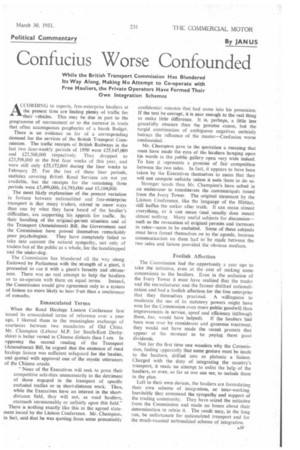Confucius Worse Confounded
Page 49

If you've noticed an error in this article please click here to report it so we can fix it.
While the British Transport Commission Has Blundered Its Way Along, Making No Attempt to Co-operate with Free Hauliers, the Private Operators Have Formed Their Own Integration Schemes
ACCORDING to reports, free-enterprise hauliers at the present time are finding plenty of traffic for their vehicles. Tins may be due in part to the programme of rearmament or to the increase in trade that often accompanies prophecies of a harsh Budget.
There is no evidence so far of a corresponding demand for the services of the British Transport Commission. The traffic receipts of British Railways in the last two four-weekly periods of 1950 were £25,847,000 and 425,568,000 respectively They dropped to 423,598,000 in the first four weeks of this year, and were still only 425,172,000 during the four weeks to February 25. For the last of these four periods, statistics covering British Road Services are not yet available, but the receipts for the remaining three periods were £5,499,000, 44,793,000 and £5,104,000.
The most likely explanation of the present variation in fortune between nationalized and free-enterprise transport is that many traders, stirred in moreways than one by what they have heard of the haulier's difficulties, are supporting his appeals for traffic. By their handling of the original-permit situation and of the Transport (Amendment) Bill, the Government and the Commission have proved themselves remarkably poor psychologists. They have completely failed to take into account the natural sympathy, not only of traders but of the public as a whole, for the handicapped and the under-dog.
The Commission has blundered all the way along. Endowed by Parliament with the strength of a giant, it proceeded to use it with a giant's ferocity and obtuse• ness. There was no real attempt to help the hauliers or to co-operate with them on equal terms. Instead, the Commission would give agreement only to a system of liaison no more likely to bear fruit than a conference of eunuchs.
Emasculated Terms
When the Road Haulage Liaison Conference first Issued its emasculated terms of reference over a year ago, I likened them to the meaningless exchange of courtesies between two mandarins of Old China. Mr. Champion (Labour M.P. for South-East Derbyshire) is better versed in Chinese dialects than I am_ In opposing the second reading Of the Transport (Amendment) Bill, he argued that the existence of road haulage liaison was sufficient safeguard for the haulier, and quoted with approval one of the mystic utterances of the Chinese oracle.
"None of the Executives will seek to press their
competitive activities unnecessarily to the detriment of those engaged in the transport of specific excluded traffics or in short-distance work. Thus, while the Executives have an interest in the shortdistance field, they will not, as road hauliers, encroach unreasonably or unfairly upon this field.
There is nothing exactly like this in the agreed statement issued by the Liaison Conference. Mr. Champion. in fact, said that he was quoting from some presumably confidential minutes that had come into his possession. If the text be corrupt, it is near enough to the real thing to make little difference. It is, perhaps, a little less gracefully obscure than the genuine canon, but the turgid combination of ambiguous negatives certainly betrays the influence of the master—Confucius worse confounded.
Mr. Champion gave to the quotation a meaning that roust have made the eyes of the hauliers hanging upon his words in the public gallery open very wide indeed. To him it tepresents a promise of fair competition between the two sides_ In fact, it appears to have been taken by the Executives themselves to mean that they will not compete unfairly unless it suits them to do so.
Stronger neads than Mr. Champion's have ached in an endeavour to transhterate the communiqués issued from the Ivory Tower. The original statement by the Liaison Conference, like the language of the Hittites, still baffles the seeker after truth. It can mean almost everything, or it can mean (and, usually does mean) almost nothing. Many useful subjects for .discussion— such as the revocation of original permits and increases in rates—seem to be excluded. Some of these subjects must have forced themselves on to the agenda, because communication on them had to be made between the two sides and liaison provided the obvious medium.
Foolish Affection The Commission had the opportunity a year ago to take the initiative, even at the cost of making some concessions to the hauliers. Even in the seclusion of the Ivory Tower it must have realized that the trader and the maaufacturer and the farmer disliked nationalization and had a foolish affection for the free enterprise that they themselves practised. A willingness to moderate the use of its statutory powers might have won for the Commission even more public goodwill than improvements in service, speed and efficiency (although these, too, would have helped). If the hauliers hail been won over by considerate and generous treatment, they would not have made the recent protests that appear at the moment to be paying thern good dividends.
Not for the first time one wonders why the Commission, feeling apparently that some gesture must be Made to the hauliers, drifted into so platonic a liaison. Charged with the duty of integrating the country's transport, it made no attempt to enlist the help of the hauliers, or even, so far as one can see, to include them in the plan.
Left to their own devices, the hauliers are formulating their own scheme of integration, or inter-working. Inevitably they command the sympathy and support of the trading community. They have seized the initiative from the Commission and made no bones about their determination to retain it. The result may, in the long run, be unfortunate for nationalized transport and for the much-vaunted nationalized scheme of integration.












































































